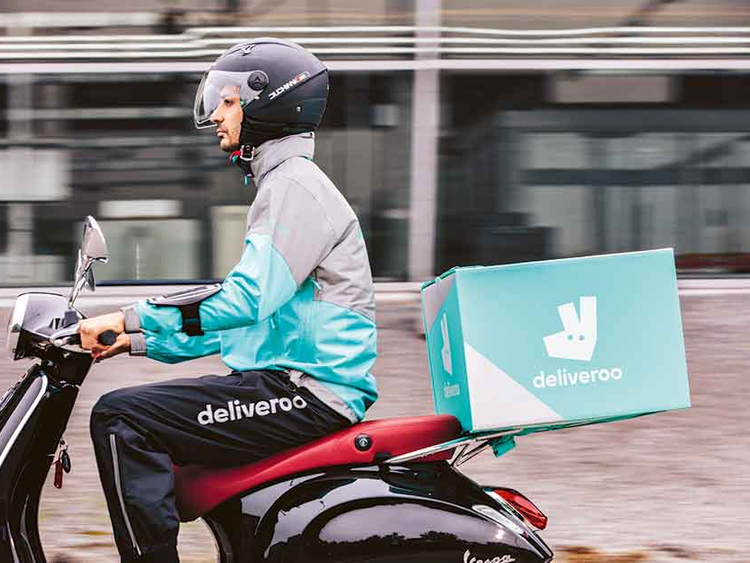You’re not imagining it: Dubai is experiencing a boom in food delivery. It seems every time you check your blindspot, a courier with a hot box on the back is overtaking you. The food delivery sector is being shaken up by aggressive newcomers such as Deliveroo and Zomato, but niche operators continue to hold on to their customers.
The number of business models for a food delivery fleet is as varied as the diversity of cuisines we can order but it all means better choice and value for home diners and a steady demand for motorcycles and other light commercial delivery vehicles.
“Third-party online ordering/delivery services are increasingly popular in the UAE, benefiting from the increasing usage of mobile internet and a surge in the ownership of smartphones,” market researcher Euromonitor says in a new report.
The research suggests that big players such as Foodonclick.com, UberEats, 24h.ae, Zomato.com and Talabat.com are helping independent restaurants and small chains reach a widening range of consumers, without needing to invest in their own online ordering sites and marketing.
In fact, there are only a handful of outlets dedicated to home delivery and these are progressively losing market share to full-service restaurants using third-party delivery services.
Deliveroo has played a large role in this shift. The UK-based company expanded to Dubai last year, its first venture outside Europe. General Manager Anis Harb says Deliveroo has brought more than 700 local partners on board in its first year.
He is enthusiastic about prospects across the GCC. “Our current month-on-month growth is 25 per cent and we are continuing to see significant growth across the region,” says Harb.
“Food delivery is ingrained in the culture — a recent report showed that more than 60 per cent of consumers order takeaway at least once a week,” says Harb.
This plays out in demand for delivery vehicles and Deliveroo works with a fleet of more than 300 drivers, he explains. “The majority of our drivers in Dubai are subcontracted through a third party and work full-time under a working visa,” says Harb.
It’s no surprise that motorbikes dominate the fast-food delivery business, with vans and other light commercial vehicles most common in bulk deliveries.
“Honda is currently the largest player in the delivery bike market,” says the company’s Marketing Communications Manager Adam Skrzypczyk. “Our customers include brands such as McDonald’s, Burger King, Pizza Hut, Chili’s and many more in the food delivery business.”
Growing market
One of Dubai’s more established operators has just launched another aspect to its ever-growing business.
Zomato has been using is now using third-party couriers to provide delivery options to restaurants that don’t have their own fleet.
“Zomato has partnered with local logistics players such as AnyOrder and RSD to target restaurants that don’t deliver on their own,” the company's Viraj Sawant said in a media statement last year. "It’s a big step to grow an already active market share."
Zomato currently processes more than 10,000 orders a day in Dubai alone, adds Regional Director Rohin Thampi.
Niche sectors
Euromonitor’s report on the food delivery sector notes a trend towards leaner options. “Healthy home delivery/takeaway could well prove a strong trend in the forecast period, given a strong health and wellness trend in the UAE and growing concern over rising levels of obesity,” the report says.
Fruitful Day was founded a year ago by a group of friends who were tired of eating junk food at their desks for lunch. They deliver fresh fruit packs to workplaces, already washed, cut and ready to eat.
Marie-Christine Luijckx-Jadalla, Managing Director of Fruitful Day, says investing in their own fleet meant they could manage their own delivery schedule and control their process end to end.
“When we set up Fruitful Day we took the decision to be totally vertically integrated as a business. Having our own fleet meant higher upfront costs, but it allowed us to have complete flexibility in the early months with our deliveries,” she says.
Fruitful Day runs CMC Veryca freezer/chiller vans, with GPS installed so it can track its drivers at all times and monitor speed limits.
Having its own fleet also allows the company unique insight into customer behaviour.
“We learned about our clients through the process, how they received our boxes of fruit, their feedback, and we even took part in the joy of kids excitedly running to the door when they see our happy, colourful van!” says Luijckx-Jadalla.
Now that it has reached a level of maturity, Fruitful Day’s growth strategy involves expanding into new territories.
Armed with its customer insights, Fruitful Day is beginning to outsource its deliveries to third-party couriers in these new markets.












